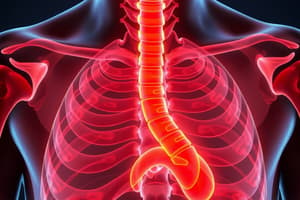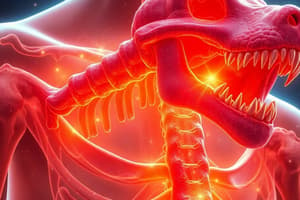Podcast
Questions and Answers
What is the primary focus of treatment for hypoparathyroidism?
What is the primary focus of treatment for hypoparathyroidism?
- Correcting calcium and phosphate imbalances (correct)
- Promoting excessive phosphate intake
- Eliminating dietary calcium completely
- Increasing the frequency of parathyroid hormone release
Which of the following might be prescribed to enhance calcium absorption in hypoparathyroidism patients?
Which of the following might be prescribed to enhance calcium absorption in hypoparathyroidism patients?
- Magnesium supplements
- Iron supplements
- Mineral oil
- Vitamin D analogs or supplements (correct)
What serious complication can arise from untreated hypoparathyroidism?
What serious complication can arise from untreated hypoparathyroidism?
- Chronic sinusitis
- Severe neurological symptoms (correct)
- Excessive salivation
- Decreased appetite
What is a necessary component of managing hypoparathyroidism treatment?
What is a necessary component of managing hypoparathyroidism treatment?
Which factor does NOT influence the prognosis for individuals with hypoparathyroidism?
Which factor does NOT influence the prognosis for individuals with hypoparathyroidism?
What primary condition results from the deficiency of parathyroid hormone (PTH)?
What primary condition results from the deficiency of parathyroid hormone (PTH)?
Which of the following symptoms is not typically associated with hypocalcemia due to hypoparathyroidism?
Which of the following symptoms is not typically associated with hypocalcemia due to hypoparathyroidism?
Which of the following is a common iatrogenic cause of hypoparathyroidism?
Which of the following is a common iatrogenic cause of hypoparathyroidism?
Which laboratory test is crucial for diagnosing hypoparathyroidism?
Which laboratory test is crucial for diagnosing hypoparathyroidism?
Which of these conditions is considered an autoimmune disorder that can lead to hypoparathyroidism?
Which of these conditions is considered an autoimmune disorder that can lead to hypoparathyroidism?
What effect does decreased PTH have on phosphate levels in the body?
What effect does decreased PTH have on phosphate levels in the body?
Which of the following is a potential long-term effect of hypocalcemia related to hypoparathyroidism?
Which of the following is a potential long-term effect of hypocalcemia related to hypoparathyroidism?
What is the hallmark clinical manifestation of hypoparathyroidism?
What is the hallmark clinical manifestation of hypoparathyroidism?
What lifestyle adaptation is crucial for patients with hypoparathyroidism?
What lifestyle adaptation is crucial for patients with hypoparathyroidism?
Which of the following complications can arise from chronic hypocalcemia in patients with hypoparathyroidism?
Which of the following complications can arise from chronic hypocalcemia in patients with hypoparathyroidism?
What is a significant factor influencing the prognosis of individuals with hypoparathyroidism?
What is a significant factor influencing the prognosis of individuals with hypoparathyroidism?
What impact can severe hypocalcemia have on cardiac function?
What impact can severe hypocalcemia have on cardiac function?
Which blood marker requires regular monitoring in patients undergoing treatment for hypoparathyroidism?
Which blood marker requires regular monitoring in patients undergoing treatment for hypoparathyroidism?
What is the underlying mechanism through which parathyroid hormone (PTH) regulates calcium levels in the body?
What is the underlying mechanism through which parathyroid hormone (PTH) regulates calcium levels in the body?
Which of the following is least likely to directly damage the parathyroid glands?
Which of the following is least likely to directly damage the parathyroid glands?
Which symptom is most specifically associated with neuromuscular dysfunction due to hypoparathyroidism?
Which symptom is most specifically associated with neuromuscular dysfunction due to hypoparathyroidism?
Which genetic condition could potentially influence the function of the parathyroid glands?
Which genetic condition could potentially influence the function of the parathyroid glands?
In cases of hypoparathyroidism, how is phosphorus level typically affected?
In cases of hypoparathyroidism, how is phosphorus level typically affected?
What function does an electrocardiogram (ECG) serve in hypoparathyroidism diagnosis?
What function does an electrocardiogram (ECG) serve in hypoparathyroidism diagnosis?
Which symptom is related to a positive Chvostek's sign?
Which symptom is related to a positive Chvostek's sign?
What is a rare cause of hypoparathyroidism involving congenital factors?
What is a rare cause of hypoparathyroidism involving congenital factors?
Flashcards
Hypoparathyroidism
Hypoparathyroidism
A condition marked by low parathyroid hormone (PTH) in the blood, leading to low calcium and high phosphate levels.
What is a common cause of hypoparathyroidism?
What is a common cause of hypoparathyroidism?
The parathyroid glands are tiny structures in the neck that produce parathyroid hormone (PTH). Damage or removal of these glands is a common cause of hypoparathyroidism.
What is the primary role of parathyroid hormone (PTH)?
What is the primary role of parathyroid hormone (PTH)?
Parathyroid hormone (PTH) primarily regulates calcium and phosphate levels in the body.
How does PTH regulate calcium levels?
How does PTH regulate calcium levels?
Signup and view all the flashcards
What are the symptoms of low calcium (hypocalcemia)?
What are the symptoms of low calcium (hypocalcemia)?
Signup and view all the flashcards
How is hypoparathyroidism diagnosed?
How is hypoparathyroidism diagnosed?
Signup and view all the flashcards
Besides damage to the parathyroid glands, what else can cause hypoparathyroidism?
Besides damage to the parathyroid glands, what else can cause hypoparathyroidism?
Signup and view all the flashcards
How can hypoparathyroidism impact bone health?
How can hypoparathyroidism impact bone health?
Signup and view all the flashcards
Treatment for hypoparathyroidism
Treatment for hypoparathyroidism
Signup and view all the flashcards
Complications of untreated hypoparathyroidism
Complications of untreated hypoparathyroidism
Signup and view all the flashcards
Prognosis of hypoparathyroidism
Prognosis of hypoparathyroidism
Signup and view all the flashcards
Calcium supplements in hypoparathyroidism
Calcium supplements in hypoparathyroidism
Signup and view all the flashcards
Role of vitamin D in hypoparathyroidism
Role of vitamin D in hypoparathyroidism
Signup and view all the flashcards
Study Notes
Definition and Etiology
- Hypoparathyroidism is a condition characterized by abnormally low levels of parathyroid hormone (PTH) in the blood.
- This deficiency leads to decreased calcium levels and increased phosphate levels.
- The primary cause often involves damage or removal of the parathyroid glands during neck surgery.
- Other causes include autoimmune disorders, genetic defects, and certain medications.
- Iatrogenic causes, meaning those caused by medical interventions, are common.
- Autoimmune parathyroiditis is an immune-mediated attack on the parathyroid gland, sometimes leading to hypoparathyroidism.
- Certain genetic syndromes can be associated with hypoparathyroidism, impacting parathyroid gland development or function.
- In some cases, hypoparathyroidism may be a consequence of infections, such as infections involving the neck tissue.
Pathophysiology
- Parathyroid hormone (PTH) regulates calcium and phosphate homeostasis.
- PTH increases calcium levels by stimulating bone resorption, increasing calcium absorption in the gut, and reducing calcium excretion by the kidneys.
- Without adequate PTH, calcium levels fall, and phosphate levels rise.
- Lower blood calcium levels, known as hypocalcemia, directly impacts nerve and muscle excitability, often leading to symptoms.
- The shift in calcium and phosphate balances disrupts normal physiological processes.
Clinical Manifestations
- Symptoms of hypoparathyroidism often develop gradually, though some people might experience acute symptoms.
- Hypocalcemia is the hallmark of the condition, initiating a range of clinical manifestations.
- Symptoms related to neuromuscular excitability include:
- Muscle cramps and spasms, particularly in the hands, feet, and face (known as tetany)
- Tingling or numbness in the fingers, toes, and around the mouth
- Seizures
- Laryngospasm (potentially life-threatening)
- Other symptoms might include:
- Fatigue
- Depression
- Mood changes
- Cataracts
- Impaired cognitive function
- Long-term hypocalcemia may also affect bone health.
Diagnosis
- Diagnosis of hypoparathyroidism relies on a combination of clinical evaluation and laboratory tests.
- Measuring serum calcium, phosphate, and PTH levels is crucial.
- Imaging studies of the neck and parathyroid glands may be needed to identify anatomical abnormalities.
- Electrocardiogram (ECG) analysis may be necessary to evaluate heart activity, as hypocalcemia can affect the heart.
Treatment
- Treatment focuses on correcting calcium and phosphate imbalances.
- Calcium supplements are typically prescribed to maintain appropriate blood levels.
- Vitamin D analogs or supplements might be given to enhance calcium absorption.
- PTH replacement therapy might be an option, depending on the severity and underlying cause.
- Regular monitoring of serum calcium and phosphate levels is essential to adjust treatment as needed.
- Dietary adjustments, such as increasing calcium-rich foods, may be part of the treatment plan in conjunction with medical interventions.
- Patient education and self-management strategies are also significant parts of the treatment approach.
Complications
- Untreated hypoparathyroidism can lead to a number of serious complications, such as:
- Severe and sustained neurological symptoms
- Damage to the nerves and muscles
- Cardiovascular complications, including arrhythmias
- Renal failure
- Dental problems
- Cataracts and or other ocular disorders
- Long-term complications and potential damage related to hypocalcemia are possible.
Prognosis
- With appropriate treatment and management, the prognosis for individuals with hypoparathyroidism is generally good.
- Regular monitoring and careful management of calcium and phosphate levels are essential for preventing complications.
- Prognosis varies depending on factors such as the severity of the condition, promptness of diagnosis, adherence to treatment, and coexisting medical conditions.
Studying That Suits You
Use AI to generate personalized quizzes and flashcards to suit your learning preferences.




